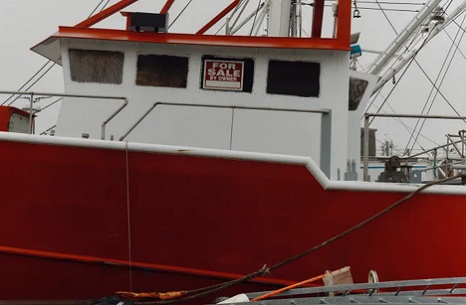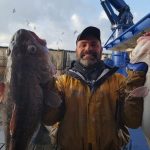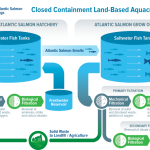Tag Archives: National Marine Fisheries Service

First Lawsuit Over Whales and Wind Dismissed
A federal district judge in Massachusetts has rejected an effort to stop an offshore wind project near Nantucket Island on the basis of danger to whales, apparently the first court test of similar claims being raised against wind turbine proposals along the U.S. eastern seaboard, including here in Virginia. On May 17, U.S. District Judge Indira Talwani granted a motion for summary judgement to the federal agency that approved the Vineyard Wind One project. With a planned 84 turbines, the project is about half the size of Dominion Energy Virginia’s planned project off Virginia Beach. Both are just the first phases of larger planned buildouts. The same judge is hearing the other cases, with the two from fishing interests now combined. >click to read< 09:47

Feds play shell game with wind / whale impacts
NOAA is taking public comments on a massive proposal to harass large numbers of whales and other marine mammals by building a huge offshore wind complex. There is supposed to be an Environmental Impact Statement (EIS) for the proposed harassment, but it is not there with the proposal. We are told it is elsewhere but after searching we find that it simply does not exist. Like a shell game where the pea has been palmed, there is nothing to be found. First the bureaucratic background. The wind project is Dominion’s 2,600 MW offshore Virginia facility, which if built would be the world’s biggest. NOAA’s National Marine Fisheries Service (NMFS) is proposing to issue a five year harassment authorization for the construction of this monster. >click to read< 07:36

Wind project scope ‘staggering’
It wasn’t “until the whales and the dolphins started washing up that people’s attention was able to focus” on the offshore wind farms, according to Cindy Zipf, and when people looked beyond the whales, they realized what is happening is “staggering.” “I don’t think ever in the history of mankind have we proposed to industrialize an ecosystem this fast and at this magnitude,” she said. Zipf is executive director of Clean Ocean Action, a coalition of groups dedicated to protecting the ocean. Zipf acknowledges the pace at which the plans are moving forward is making efforts to slow or stop them difficult. “It’s challenging considering how fast-tracked everything is and how limited the permitting process is. It’s kind of under the jurisdiction of two people to make it happen, President Biden and Gov. Murphy,” she said. “Hopefully as more is understood there will be some more caution but as it is right now the (state and federal) agencies are very enthusiastic.” >click to read< 16:29
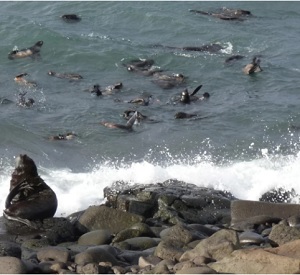
Proposed Bering Sea marine sanctuary draws pushback from fishing industry
The Aleut Community of St. Paul, the tribal government for the Pribilof Island community of around 500 people, says the sanctuary designation would give it greater authority to protect the region’s vast ecosystems and resources, including rich fishing grounds and habitat for the federally protected northern fur seal. NOAA accepted the tribe’s nomination last year, which set off panic bells in the commercial fishing industry. Many in the industry have voiced concerns that bringing in another co-manager could threaten the industry, even though NOAA and the tribe say the change would not affect fishing regulations. Commercial fishing representatives railed against the proposed sanctuary during an April 6 meeting in Anchorage, which NOAA hosted to clear up confusion within the industry. >click to read< 12:06
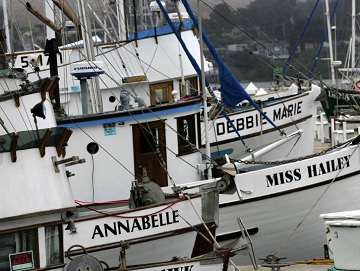
State, federal officials vow to take quick action on Federal Fishery Disaster Declaration for salmon fishing industry
State and federal officials are vowing to move quickly to secure disaster aid for Californians affected by the closure of this year’s commercial and recreational salmon season, which could have an economic impact of $1.4 billion, according to one industry group. The administration of Gov. Gavin Newsom requested a Federal Fishery Disaster Declaration from U.S. Commerce Secretary Gina Raimondo after a decision Thursday by the Pacific Fishery Management Council to recommend full closure of both commercial and recreational salmon seasons this year. It’s unclear what that might mean in terms of total dollars and eligible stakeholders. >click to read< 08:03
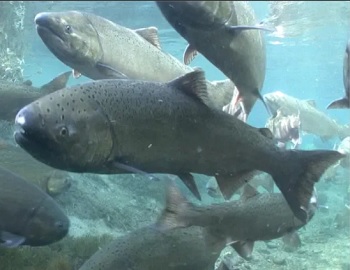
Oregon fishing season called off due to dwindling salmon populations
An extremely low “abundance” of California Chinook salmon stocks and projected low spawning escapements has led to the cancellation of the upcoming commercial and recreational salmon fishing season along most of the Oregon coast. Thursday’s announcement came in two parts from the Oregon Department of Fish and Wildlife, with both actions canceling fishing seasons between March 15 and May 15, 2023. According to Fish and Wildlife, the action applies to all commercial ocean troll salmon fishery seasons from Cape Falcon to the Oregon-California Border. Meanwhile, recreational salmon fishing has been canceled in ocean waters between Cape Falcon and Humbug Mountain off the Oregon coast. >click to read< 08:45
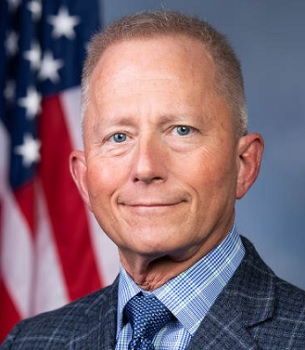
Fed Official: Offshore Wind Will Adversely Impact North Atlantic Right Whale
Ahead of his March 16 hearing on offshore wind at the Wildwood Convention Center, Congressman Jeff Van Drew is challenging the federal government and offshore wind companies to prove they have nothing to hide when it comes to negatively impacting the environment. “Hearings are critical,” he said in a statement released last week condemning President Joe Biden’s administration for “its continual lack of transparency with the American people – this time about the correlation of offshore wind development and the death of endangered whales.” Van Drew’s latest comments follow the release of a May 13, 2022 missive from Sean Hayes, chief of protected species for NOAA’s National Marine Fisheries Service. In the letter to Brian Hooker, lead biologist for Bureau of Ocean Energy Management, Office of Renewable Energy Programs, Hayes laid out how offshore wind development in New England would negatively affect the North Atlantic right whale. >click to read< 08:04

Fate of NJ Fishermen in the Hands of Supreme Court
New Jersey herring fishermen asked the Supreme Court in a final brief to rein in regulators that rely on judicial deference to circumvent the will of Congress. The fishermen are challenging the lawfulness of a regulation that could force them to hand over 20 percent of their pay to third-party at-sea monitors they must carry on their boats—a mandate that Congress never approved by statute and did not give the National Marine Fisheries Service (NMFS) the authority to require by regulation. The U.S. Solicitor General recently filed a brief with the Court urging the justices to ignore the checks and balances of the U.S. Constitution in order to preserve the controversial doctrine of Chevrondeference. >click to read the press release< 15:22
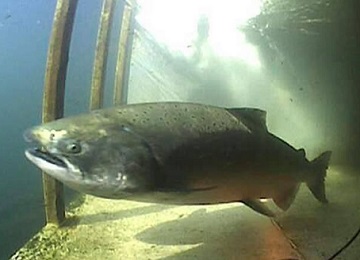
PD Editorial: Listen to fishermen: Skip salmon season
When people call for action that goes against their own short-term interests, something bigger must be at stake. The public should pay attention. So, it is with three associations of West Coast fishermen that have called for a shutdown of this year’s California salmon fishing season. Members of all three associations know that a closure will cost them dearly, but they understand that this year’s pain is the best chance for long-term survival. But the people who know salmon best and rely on them most — members of the Pacific Coast Federation of Fishermen’s Associations, the Golden Gate Fishermen’s Association and the Northern California Guides and Sportsmen’s Association — say that it’s time for a pause. >click to read< 11:44
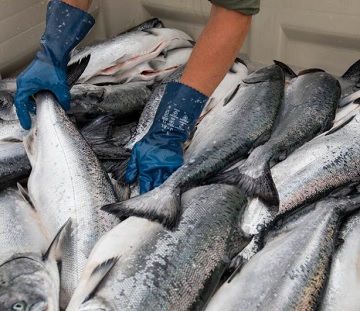
Poor outlook for king salmon could shut down California’s sport and commercial seasons
This year’s official “forecast abundance” estimates that just 169,767 adult chinook salmon are waiting off shore to be caught — a substantial decrease from the 396,458 predicted last year and forecasts above 800,000 a decade ago. A nearly 2-month delay in the Dungeness crab season this year meant commercial crabbers missed the Thanksgiving, Christmas and New Year’s holidays and then had a glut of fresh crab available when the market was weak, said veteran fisherman Dick Ogg, vice president of the Bodega Bay Fisherman’s Marketing Association, which represents the local commercial fleet. Though Ogg participates in a variety of fisheries, many locals only do salmon, crab or both. “For the guys that only have salmon as a potential income, it’s going to be devastating,” he said, “and for the guys who have salmon and crab, and who have had a minimal crab season, it’s going to be devastating.” >click to read< 09:05

Maine lobster industry wages legal battle over recent regulations, while new ones remain frozen
The Maine Lobstermen’s Association in September appealed a ruling in a lawsuit against federal regulators in which a judge rejected the association’s attempt to block the National Marine Fisheries Service’s 10-year plan to reduce the risk posed by fishing gear to North Atlantic right whales. The animals risk injury or death when they become entangled in lines or gear. The case has been moving with relative speed through the court system, with oral arguments presented in the U.S. Court of Appeals in Washington, D.C., last week. The association argued that the National Marine Fisheries Service, part of the National Oceanic and Atmospheric Administration, failed to rely on the best scientific information available and did not account for the impact of conservation measures already adopted by the Maine lobster fishery. In effect, the lobstermen argue, the federal government placed its thumb on the scale in favor of the whales. >click to read< 10:56

Federal court hears arguments from Maine lobstermen appealing right whale regulations
A federal appeals court heard arguments Friday from the Maine Lobstermen’s Association, which is challenging a government plan to regulate the fishery and conserve endangered right whales. The Maine Lobstermen’s Association had promised to take its latest appeal of federal fishing regulations all the way to the U.S. Supreme Court, if necessary. But lobstermen hope they’ll avoid that prospect, especially with Paul Clement, an attorney with more than 100 past Supreme Court appearances, representing Maine. >click to read< 07:22
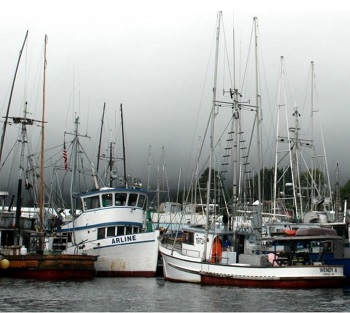
Southeast Alaska communities set to join opposition to lawsuit that threatens king salmon fishery
Ketchikan, Wrangell and Petersburg are set to join a growing chorus of Alaska voices highlighting the impact the suit could have on the region’s fishing fleet. The lawsuit from the Washington state-based Wild Fish Conservancy centers on an endangered Puget Sound population of orcas known as Southern Resident killer whales. Killer whales eat salmon, especially big, meaty king salmon, and the conservation group argues federal officials haven’t properly accounted for the impact the Southeast king salmon fishery has on the Puget Sound orcas. Late last year, a federal judge issued a report that threatens to close the Southeast king salmon fishery until the National Marine Fisheries Service comes up with a fix. >click to read< 11:50
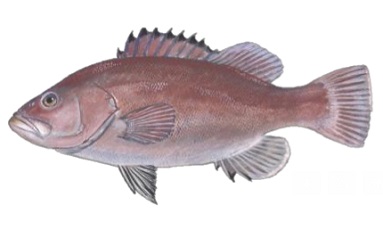
Proposed Snowy Grouper Management Measures Will Harm the Stock and Commercial Fishermen — Help Us Fight
Last fall the [SAFMC] South Atlantic Fishery Management Council approved Amendment 51 to the South Atlantic Snapper/Grouper FMP. Now the National Marine Fisheries Service (NMFS) is considering whether or not to sign it into law. Amendment 51 would modify snowy grouper management measures for the worse. It will continue to allow recreational sector over-harvesting, increase recreational dead discards, harm the stock, and deal another devastating blow to commercial fishermen in the South Atlantic. Our commercial fisheries are under attack with a 43% reduction of ACL and Amendment 51 is just the latest salvo with more to come. Now is our chance to stand up for conservation and commercial fishermen. >click to read< 10:45
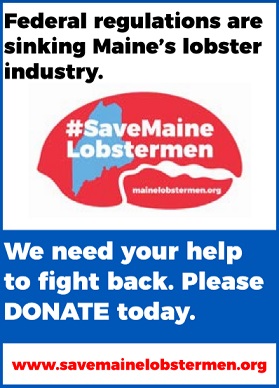
MLA back in court this month over federal lobstering rules
The Maine Lobstermen’s Association continues its court fight against the National Marine Fisheries Service, challenging its biological opinion for the endangered right whale, released in May 2021, and the science used to inform it. The MLA lost its original lawsuit in Sept. 2022 but was granted the right to appeal. Oral arguments are scheduled for Feb. 24 in the U.S. Court of Appeals in the District of Columbia. The Maine Department of Marine Resources and the Maine Lobstering Union Lodge 207, the Massachusetts Lobstermen’s Association, are intervenors in the case. “[The six-year delay] just really amplifies the concerns that the MLA has had,” MLA executive director Patrice McCarron said. “It highlights and exemplifies the importance of the work we’ve done and the importance of letting the lawsuit run its course.” >click to read< 09:23
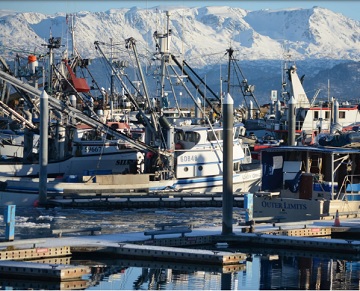
Lawsuit threatens to shut down Southeast salmon troll fishery
An ongoing lawsuit by a Washington State environmental group is threatening to shut down the Southeast Alaska salmon troll fishery in the summer and winter to help endangered Puget Sound orca whales, and has prompted the trollers to ask the City of Sitka to help pony up for legal bills. The Seattle-based group Wild Fish Conservancy filed suit last year and a federal court ruled last August that the National Marine Fisheries Service had violated the Endangered Species Act and the National Environmental Policy Act in approving salmon harvests in the Southeast troll fishery, which catches chinook salmon, a key food source for the Puget Sound orcas. In the meantime, lawsuits and rulings are continuing. >click to read< 08:36
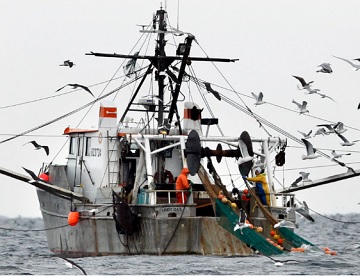
New monitoring rules for Northeast fishermen
Changes to U.S. rules about the monitoring of Northeast commercial fishing activities are going into effect this month with a goal of providing more accurate information about some of the nation’s oldest fisheries. The U.S. mandates observers to work onboard fishing boats to collect data and make sure fishermen adhere to rules and quotas. The National Marine Fisheries Service has adopted new monitoring rules for Northeast fishermen of groundfish, like haddock and flounder, to try to improve the accuracy of the data. >click to read< 11:57
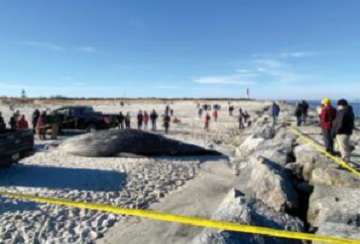
Advocacy Groups Demand Transparent Investigation into Deaths of Six Endangered Whales
Calling the deaths of six endangered whales that have washed up in 33 days on the beaches of New Jersey and New York “alarming and environmentally harmful,” local, state and regional ocean advocacy groups are calling for President Joe Biden to immediately address the unprecedented trend. “The noise from the offshore wind vessel is a potential cause of the recent whale stranding and increased near-shore sightings,” said Bob Stern, president of Save LBI, a nonprofit, non-partisan coalition opposed to the placement of offshore wind farms off Long Beach Island. “The beached whales bear no sign of vessel strike or fishing gear entanglement, leaving natural causes or noise as the potential causes and raising the likelihood that our concerns were well-founded.” >click to read< 16:03
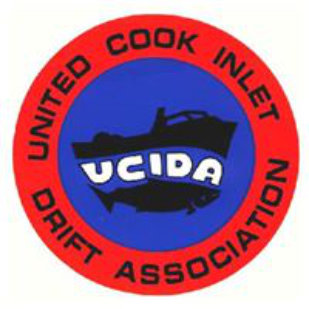
Council has 4 months to fix Cook Inlet salmon fishery management plan
The future of the Cook Inlet salmon fishery is again in the air as the North Pacific Fishery Management Council debates how to manage it after a federal court ruled that it has to write a new plan. It’s been six years since a federal court ruled that the council’s decision to remove Cook Inlet from a federal management plan and defer entirely to the state was illegal. The council initially decided to remove Cook Inlet in 2012, a decision that the United Cook Inlet Drift Association challenged in court. In 2016, the court agreed with the association, ordering the council to create a new federal management plan that includes the federal waters of Cook Inlet. >click to read< 09:47

With bill’s passage, lobster industry welcomes 6-year break from new regulations
Hours before a stopgap spending measure was set to expire, Congress voted to pass the $1.7 trillion omnibus package to fund the government through September 2023. The package passed in the Senate Thursday afternoon with a large bipartisan majority, 68-29. Maine’s delegation was able to include a rider in the package that protects lobstermen for six years from rules that the industry says would decimate the state’s iconic fishery and coastal economy. The provision essentially reverses a federal court decision this summer on new lobstering regulations by preventing them from taking effect until Dec. 31, 2028. >click to read< 09:14
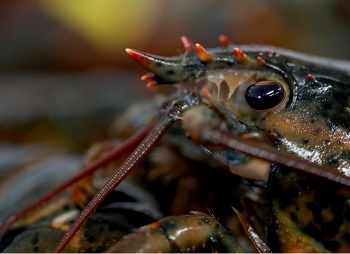
Lobster more than a Maine event
The headline said that Whole Foods would no longer be selling Maine lobster in its stores. My first reaction was to wonder what the lowly, although expensive crustacean had done to warrant such action from Whole Foods usually described as an upscale grocery chain that is owned by Amazon and as such is a part of the Jeff Bezos’ empire. To add insult to injury the California based Monterey Bay Aquarium through its environment focused seafood watch went and “red listed” Maine lobsters. I guess that means shipments of Maine lobsters will be stopped at the California border. I wonder if that includes the border with Mexico where just about anything gets through? Obviously, the Maine lobstering industry is up in arms over all this. >click to read< By Thomas Kirkpatrick Sr 12:56

Walton: Maine lobsters — a coast to coast dispute
Some years back I wrote about my distaste for seafood. If it swims in our oceans or lakes, I don’t eat it. To my surprise, many readers acknowledged they feel the same. So perhaps they are as shocked as I am that I rise to the defense of the Maine lobster industry, which finds itself on a prominent and respected environmental “watch” list, threatening thousands of jobs up and down the Maine coast. Why should a guy who prefers a good burger care? >click to read< 08:19
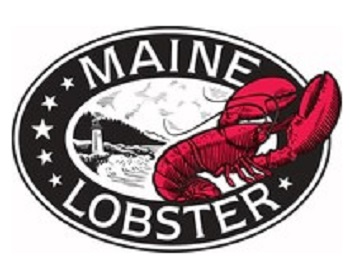
Ongoing Legal Battles Put Maine Lobster Fishery in Crosshairs, Results in Suspension of Marine Stewardship Council Certification
An ongoing legal dispute between environmental activists and the federal government has led Maine Lobster’s Marine Stewardship Council (MSC) fishing certification to be suspended. An independent auditor conducted a comprehensive evaluation of the fishery earlier this year and determined that Maine Lobster is a well-managed and sustainable fishery according to MSC fisheries standards. Shortly after this assessment, a court ruled that regulations issued by the National Marine Fisheries Service to govern the management of North American right whales (NARW) do not meet the requirements of federal laws to protect endangered species. As a result of this court ruling, while the industry has complied with all regulations in good faith, the independent auditor suspended the MSC certificate of the fishery. >click to read< 18:02

Draft North Atlantic Right Whale and Offshore Wind Strategy Announced
As the Bureau of Ocean Energy Management (BOEM) has ramped up offshore wind development to meet the Biden-Harris administration’s goal of generating 30 gigawatts of offshore wind by 2030, the question of how the expansion of offshore wind energy could affect the critically endangered North Atlantic right whale (NARW) has come under close review. To help address this question and support the recovery of endangered NARW and the responsible development of offshore wind energy, BOEM and the National Oceanic and Atmospheric Administration’s National Marine Fisheries Service (NOAA Fisheries) developed a joint Draft North Atlantic Right Whale and Offshore Wind Strategy (the Draft Strategy). >click to read< 11:29

Federal officials issued ‘economically debilitating’ rules on the Maine lobster industry, court filing says
The Maine Lobstermen’s Association on Thursday filed its opening brief with the U.S. Court of Appeals as the industry works to beat back regulations that it says will crush Maine’s signature fishery. Federal officials have proposed gear modifications to reduce the incidence of entanglement for endangered right whales, which number about 340. Other regulations would close certain areas to lobster fishing while the whales are migrating. The lobstermen’s association argues that the National Marine Fisheries Service must prove Congress gave it authority to issue stringent rules. >click to read< 07:17
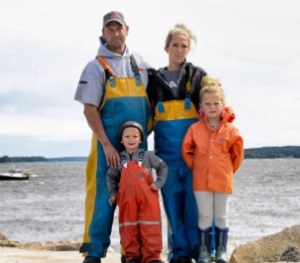
Maine Lobstermen’s Association Files Opening Brief in Appeal of Burdensome Federal Regulations
The fight to save Maine’s iconic lobster industry has reached the U.S. Court of Appeals for the D.C. Circuit, as the Maine Lobstermen’s Association (MLA) filed its opening brief in a challenge to the federal regulations poised to crush workaday fishermen. The National Marine Fisheries Service (NMFS) is implementing a rule that requires fishermen to reduce the risk of right whale entanglement with lobster gear by 98 percent. The overwhelming majority of Maine lobstermen are unable to afford compliance with the draconian risk reduction plan, that according to the NMFS, will not even recover the whale population. The plan will likely result in a corporate takeover of the remnants of Maine’s fishery, destroying the culture, charm, and most importantly, the families and communities who have responsibly fished Maine lobsters for generations. >click to read the press release< 11:38

First National Bank supports Maine’s lobster industry with $300K donation
First National Bank announced Monday a $300,000 commitment to the Maine Lobstermen’s Association. The donated funds will take the form of a $150,000 direct donation to the MLA’s Save Maine Lobstermen campaign. The MLA is currently appealing a court decision in its lawsuit against the National Marine Fisheries Service which, if enacted, would decimate Maine’s lobster industry and negatively affect not only the economy of Maine’s coastal communities, but also the economy of the entire state. Additionally, the Bank will provide longer term support in the amount $150,000 to assist the industry in any way the Association sees fit. >click to read< 11:21

Maine lobster group backs new speed limit on ships to protect whales
A proposal to expand speed limits along the East Coast might have little impact on vessels off Maine and is not directly linked to two lawsuits over pending federal regulations for the state’s lobster fishery. Still, the groups involved in that litigation recently weighed in on the speeding proposal, which is part of broader efforts to save right whales from extinction. The Maine Lobstermen’s Association and four conservation groups supported the stricter limits but took issue with other aspects of the rules and reiterated the priorities that have driven their court battles. >click to read< 09:31






